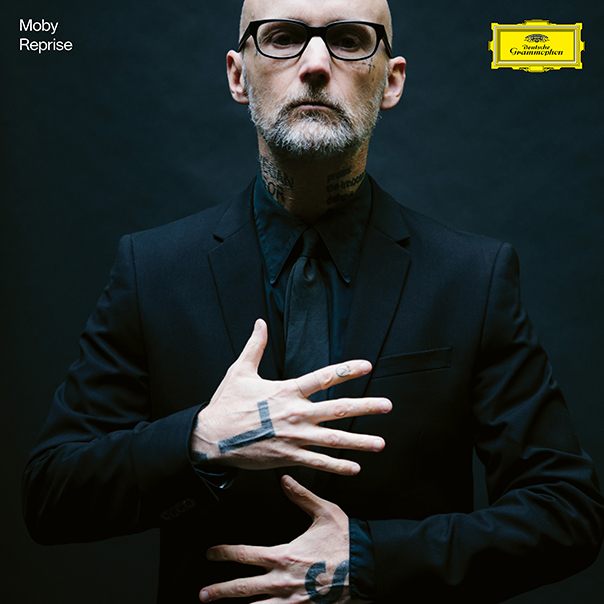ALBUM REVIEW: Moby recreates the magic on ‘Reprise’

Moby “Reprise.”
Moby had enough hits just off his 1999 album, Play, to last a lifetime. But the DJ/producer extraordinaire, whose career has now spanned three decades, has never been one to let his songs rest. He’s explored music-making in numerous sonic spaces over the years, and his latest, Reprise, takes some of those biggest hits, as well as early career successes, and reimagines them in either orchestral or acoustic environments—to resounding success.
Reprise
Moby
Deutsche Grammophon, May 28
9/10
Half of the 14 tracks on Reprise come from Play, as well as Moby’s other mainstream hit, 2002’s 18. Also represented in this collection are 2005’s Hotel, 2013’s Innocents, 1992’s self-titled debut and 1995’s Everything Is Wrong. It’s but a small sampling of Moby’s varied work, but when presented in string-heavy arrangements and supported by an updated cast of characters—from the well-known to the emerging—Reprise feels like a complete collection.
Just because this is an acoustic-centered album doesn’t mean it’s lacking grand bombast. Listen to tracks like “Why Does My Heart Feel So Bad” (Play) and “Lift Me Up,” the lone representative from Hotel. The latter pairs aged, crackling vocals, galloping bass- or timpani-drum framework, swelling strings and a piano. The racing synthetic heartbeat of the song is gone. But make no mistake, the heartbeat is still there, and it’s still racing.
The orchestration is provided courtesy of the Budapest Art Orchestra, whose role on the record cannot be understated. Album opener “Everloving,” one of the Play hits, also introduces the album’s dichotomy of sparse slow-burning jams and bombast. The first two-thirds of the track comes across as classical mood music, with two or three violin harmonies dancing with each other alongside a twinkling piano, which the original version did with a lone guitar melody. But where the original turned into a sort of rock track, this one slowly explodes in a burst of even more strings.
That leads into “Natural Blues,” also off Play. Both versions are explosive, but in different ways. The original was dirge-like, but this version sounds more joyous, due to the vocal contributions of jazz vocalists Gregory Porter and Amythyst Kiah. The two singers add a gospel quality to the song, which also seems to have a more varied musical palate, while the original had a one- or two-chord base.
Looking for a Moby Afro-Caribbean jam? You’ll find that on “Go,” a new version of his first hit from 1992. At least it starts that way, with cacophonous hand drumming and piano. Along the way, it turns into a heart-pounding, moody “James-Bond”-esque tune. The original was a true-to-the-early-’90s jock-jam-like cheer song. So… yeah… that’s how far this one has traveled to get to its new arrangement.
Moby, of course, isn’t known for “James Bond.” He’s known for the “Bourne” film series! “Extreme Ways,” from 18 and the series’ soundtrack, also makes this cut. But in this case, Moby reverts the original version of the song, which already featured some synthetic string melodies (including that instantly recognizable intro) into a folky acoustic guitar tune. Gone is the percussion. The strings are there but serve as a backing melody rather than a highlight instrument. This has the effect of spotlighting the downtrodden vocals. Remember that instantly recognizable string intro in the original? Moby brings it back to the song’s bridge. This time, they’re not synthetic. If you’ve got a heartbeat and enjoyed the original, this will make the hair on your arms stand on end.
The performance of Icelandic concert pianist Víkingur Ólafsson highlights the symphonic take on “God Moving Over The Face Of The Waters” (off ’95’s Everything Is Wrong). This song is stylistically the most similar to the original, but manages to feel less synthetic and includes new movements as it jumps from nearly six minutes to nearly eight minutes in length. A jazzy reinvention of “We Are All Made Of Stars” (18) is also led by piano, some open hi-hat percussion and a backing choir. Violins aren’t generally associated with jazz, yet they’re thrown in for good measure and add to the multidimensional mood.
Jim James of My Morning Jacket sings on Play hit “Porcelain,” another song that mixes styles. There are still some squelchy synths, and a jazzy piano contribution as well. While the original was a muted slow-burner, this new string-led arrangement brings a crispness to both the individual instruments and vocals.
“Great Escape” (18) is still led by the cello and still seems inspired by U2’s “So Cruel,” but the voices of cowriters Maria Taylor and Orenda Fink (Azure Ray) are replaced by Nataly Dawn, Alice Skye and Luna Li. Likewise, “Almost Home” (Innocents) trades in the contributions of indie rock stalwart Damien Jurado for up-and-comer Novo Amor, frequent Moby vocalist Mindy Jones and Boston band Darlingside. The vocals of Skylar Grey are brought higher up in the mix on album closer, “The Last Day,” also off Innocents.
A surprise comes in the inclusion of a slow and straightforward cover, sung by Jones, off David Bowie’s “Heroes.” The song has been instrumental to Moby the artist, yet it appears he’s never released a version of his own before.
The emotional core of Reprise lies in songs featuring the weathered vocals of Mark Lanegan and Kris Kristofferson on “The Lonely Night.” Lanegan already appeared on the original 2013 version of the song, but Kristofferson mirrors him, adding incredible depth.
Follow editor Roman Gokhman at Twitter.com/RomiTheWriter.
